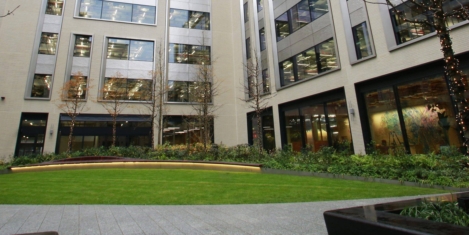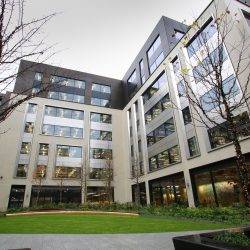February 21, 2018
Cities must harness potential of new technology to keep themselves moving
 The UK Government needs to develop a new transport strategy based on local partnerships to keep up with technological advances in areas such as self-driving cars, claims a new report. Rethinking Urban Mobility has been published by engineering company Arup, in collaboration with the London Transport Museum, law firm Gowling WLG and transport company Thales. The report coincides with the publication of a similar study from the World Economic Forum which claims that autonomous and shared vehicles, digitalisation and decentralisation of energy systems require new approaches to mobility.
The UK Government needs to develop a new transport strategy based on local partnerships to keep up with technological advances in areas such as self-driving cars, claims a new report. Rethinking Urban Mobility has been published by engineering company Arup, in collaboration with the London Transport Museum, law firm Gowling WLG and transport company Thales. The report coincides with the publication of a similar study from the World Economic Forum which claims that autonomous and shared vehicles, digitalisation and decentralisation of energy systems require new approaches to mobility.








 Demand for office space in Scotland’s three largest cities pushed overall take-up beyond 2m sq ft last year, aided by a solid final quarter of occupational deals in Aberdeen and Glasgow, and an all-time record year for Edinburgh. Scotland’s offices market in 2017 reach ed2.4 million sq ft, 14 percent above the 10 year average, according to the latest Scottish Office Spotlight from Savills. In Edinburgh (city centre and wider market) office take-up amounted to a record 1.1 million sq ft boosted by the ongoing growth of tech in the city. According to data from Stack Overflow, the Scottish capital saw a 19 percent increase in data scientists employed in the city centre over the course of 2017. Activity places further pressure on supply with only 220,000 sq ft of Grade A now available which Savills suggests will push top rents to £34 per sq ft in 2018. Keith Dobson, director in the business space agency team at Savills in Edinburgh, says: “The soon to be completed 40,000 sq ft office scheme at 2 Semple Street will ease pent up demand come Q2 2018, whilst The Mint Building and Capital Square will complete in 2019 and 2020 respectively.”
Demand for office space in Scotland’s three largest cities pushed overall take-up beyond 2m sq ft last year, aided by a solid final quarter of occupational deals in Aberdeen and Glasgow, and an all-time record year for Edinburgh. Scotland’s offices market in 2017 reach ed2.4 million sq ft, 14 percent above the 10 year average, according to the latest Scottish Office Spotlight from Savills. In Edinburgh (city centre and wider market) office take-up amounted to a record 1.1 million sq ft boosted by the ongoing growth of tech in the city. According to data from Stack Overflow, the Scottish capital saw a 19 percent increase in data scientists employed in the city centre over the course of 2017. Activity places further pressure on supply with only 220,000 sq ft of Grade A now available which Savills suggests will push top rents to £34 per sq ft in 2018. Keith Dobson, director in the business space agency team at Savills in Edinburgh, says: “The soon to be completed 40,000 sq ft office scheme at 2 Semple Street will ease pent up demand come Q2 2018, whilst The Mint Building and Capital Square will complete in 2019 and 2020 respectively.”


 There have been 18 months of faltering net effective rents within the commercial office market in the Capital since the Brexit referendum, with ten of the 18 Central London office submarkets monitored in Cluttons’ latest London Office Market Outlook report registering rent falls in the final quarter of 2017, buoyed by additional incentives such as contributions to fit out costs and even delayed completions becoming commonplace in many locations. The report also raises concerns about the potential for an oversupply of serviced offices within the Capital. However, despite this and a perception that Central London offices are currently fully prices or possibly over-priced, by both occupiers and domestic investors, London remains a resilient city, continuing to attract high volumes of overseas capital. Employment growth is of course expected to be influenced by both the levels of GDP growth during 2018 and the Brexit divorce proceedings, which in turn will affect rental values. But says the report, aside from concerns over Brexit, there is no evidence from recruitment agencies to suggest a current, or planned exodus of finance and banking professionals from the City.
There have been 18 months of faltering net effective rents within the commercial office market in the Capital since the Brexit referendum, with ten of the 18 Central London office submarkets monitored in Cluttons’ latest London Office Market Outlook report registering rent falls in the final quarter of 2017, buoyed by additional incentives such as contributions to fit out costs and even delayed completions becoming commonplace in many locations. The report also raises concerns about the potential for an oversupply of serviced offices within the Capital. However, despite this and a perception that Central London offices are currently fully prices or possibly over-priced, by both occupiers and domestic investors, London remains a resilient city, continuing to attract high volumes of overseas capital. Employment growth is of course expected to be influenced by both the levels of GDP growth during 2018 and the Brexit divorce proceedings, which in turn will affect rental values. But says the report, aside from concerns over Brexit, there is no evidence from recruitment agencies to suggest a current, or planned exodus of finance and banking professionals from the City.


 The UK has been ranked as the eighth best country in the world for the ability to attract, retain, train and educate skilled workers, but while its ability to leverage diversity for talent competitiveness is boosted by its global knowledge skills – the UK is undermined by its weaker performance on tolerance and gender equality. According to the Global Talent Competitiveness Index GTCI) produced by the Adecco Group, with international business school INSEAD and Tata Communications, the UK has a particularly strong pool of global knowledge skills, a variable for which it is ranked third in the index boosted further by its strong regulatory, market and business landscape. But this is undermined by its internal openness, where it still lags behind, especially when it comes to gender equality. The report also suggests that although Article 50 was triggered in 2017, the ongoing negotiations and continuing lack of clarity over the UK’s position once it leaves the European Union in 2019, means the impact of Brexit is not yet clear.
The UK has been ranked as the eighth best country in the world for the ability to attract, retain, train and educate skilled workers, but while its ability to leverage diversity for talent competitiveness is boosted by its global knowledge skills – the UK is undermined by its weaker performance on tolerance and gender equality. According to the Global Talent Competitiveness Index GTCI) produced by the Adecco Group, with international business school INSEAD and Tata Communications, the UK has a particularly strong pool of global knowledge skills, a variable for which it is ranked third in the index boosted further by its strong regulatory, market and business landscape. But this is undermined by its internal openness, where it still lags behind, especially when it comes to gender equality. The report also suggests that although Article 50 was triggered in 2017, the ongoing negotiations and continuing lack of clarity over the UK’s position once it leaves the European Union in 2019, means the impact of Brexit is not yet clear.


























